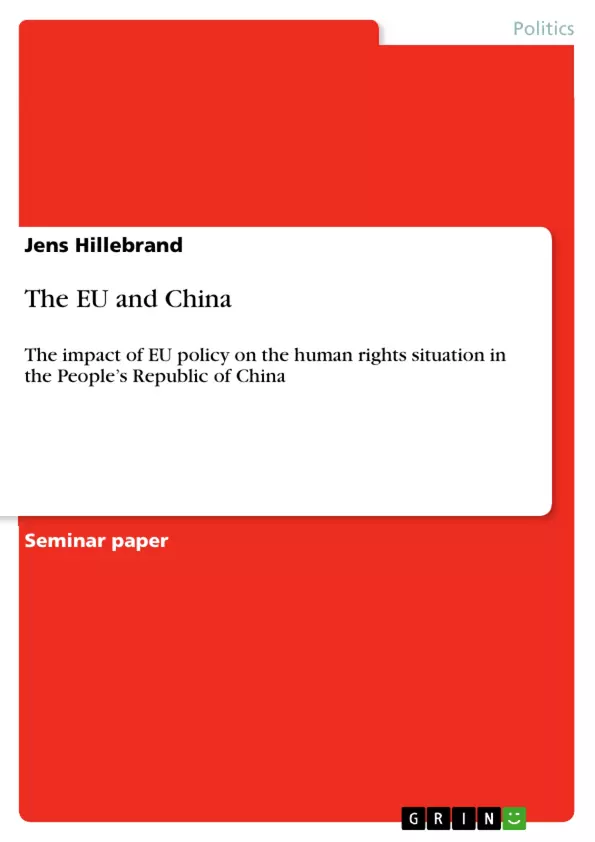This paper examines the impact of policies of the European Union (EU) on the human rights development in the People’s Republic of China (PRC). To this end the definition of human rights from a United Nations perspective will be used.
After briefly looking at the history of human rights abuses in China, the paper turns towards the main analysis shedding light on the EU’s conditional engagement policy towards China and the nature of the EU-China relations - whether it be a true strategic partnership or merely a strategic dialogue.
The paper then evaluates the success of the EU’s policy by looking at how far it has been able to achieve its objectives set with regard to human rights in the PRC. Moving on from the achievements to date, a critical outlook on the prospects of Europe’s strategy is given comprising an analysis of the opportunities and challenges the EU is likely to face in this respect.
Finally, the paper concludes that the impact of the European Union on the human rights development in China remains far from clear-cut. Whereas some scholars and politicians attribute much of the observed advancements to Europe’s conditional engagement policy, others challenge this view and contest that developments in this area are predominantly related to China’s overall economic progress. While the truth probably lies somewhere in between these two opposing views, future human rights development in the PRC will nevertheless remain a challenging task. Whereas developments on the economic and social side are also in China’s interest and will thus be relatively easy to promote, holistic progress - including civil and political rights - will only be possible if substantial differences between the EU and China can successfully be dissolved. Amongst other things, this will require the development of deep mutual cultural understanding and the discovery of sophisticated, novel negotiation approaches. Due to the complexity and sensitivity of the involved issues meaningful progress will only develop gradually, though, and the achievement of a universally acceptable human rights standard in China will still require a substantial amount of time as well as the willingness to compromise on behalf of both parties.
Inhaltsverzeichnis (Table of Contents)
- Introduction
- Human Rights
- The Universal Declaration of Human Rights
- History of the Human Rights Situation in China
- Mao Zedong
- Invasion of Tibet
- Cultural Revolution
- Tiananmen Square
- Falun Gong
- Recent Developments: The Beijing Olympics and Tibet Protests
- Mao Zedong
- The European Union's China Policy
- Strategic Partnership vs. Strategic Dialogue
- Conditional/Constructive Engagement
- Impact of EU Policy on Human Rights Situation in China
- Achievements to date
- Future Challenges and Prospects
- Conclusion
Zielsetzung und Themenschwerpunkte (Objectives and Key Themes)
This paper aims to analyze the influence of European Union (EU) policies on the human rights situation in the People's Republic of China. The paper utilizes a United Nations (UN) perspective on human rights and examines the EU's conditional engagement policy towards China. It delves into the nature of EU-China relations, exploring whether it is a true strategic partnership or simply a strategic dialogue.
- The impact of EU policies on human rights development in China
- The definition of human rights from a UN perspective
- The EU's conditional engagement policy towards China
- The nature of the EU-China relationship
- The effectiveness of the EU's policies in achieving its human rights objectives in China
Zusammenfassung der Kapitel (Chapter Summaries)
The paper begins by introducing its objectives and providing a definition of human rights based on the Universal Declaration of Human Rights. Chapter 2 explores the history of human rights abuses in China, focusing on the actions of Mao Zedong, including the invasion of Tibet and the Cultural Revolution, as well as the Tiananmen Square crackdown, the suppression of the Falun Gong, and recent human rights abuses related to the Beijing Olympics and Tibet protests. Chapter 3 analyzes the EU's policies towards China, including the distinction between strategic dialogue and strategic partnership, and the intentions of the EU's conditional engagement policy. Chapter 4 evaluates the impact of EU policies on the human rights situation in China, examining achievements to date, specifically in the areas of economic and social rights, the rule of law, and China's responses to human rights complaints. The chapter also addresses shortcomings in the areas of civil and political rights. Finally, Chapter 5 critically examines the prospects for success of the EU's strategy and the challenges it faces, including trade-offs between different types of human rights, conflicting views on human dignity and democracy, and differences in opinion on the applicability of conditional engagement policies.
Schlüsselwörter (Keywords)
This paper focuses on human rights, the European Union (EU), China, conditional engagement, strategic dialogue, strategic partnership, human rights abuses, economic progress, civil rights, political rights, and the impact of EU policy on human rights development in China.
Frequently Asked Questions
How does EU policy affect human rights in China?
The impact is complex; while some credit the EU's conditional engagement for advancements, others argue that progress is mainly due to China's own economic development.
What is the "Conditional Engagement" policy?
It is a strategy where the EU engages with China economically and politically while setting objectives and conditions regarding human rights improvements.
What is the difference between a strategic partnership and a strategic dialogue?
The paper examines whether EU-China relations have reached a deep "partnership" or remain at the level of a more formal "dialogue" with significant unresolved differences.
What are the historical roots of human rights issues in China?
The paper looks at events such as the Cultural Revolution under Mao Zedong, the Tiananmen Square crackdown, and more recent issues like the Tibet protests.
Can economic rights be separated from civil and political rights?
While economic and social progress is often in China's own interest, the EU faces challenges in promoting holistic progress that includes civil and political liberties.
- Citar trabajo
- Jens Hillebrand (Autor), 2008, The EU and China, Múnich, GRIN Verlag, https://www.grin.com/document/115369



